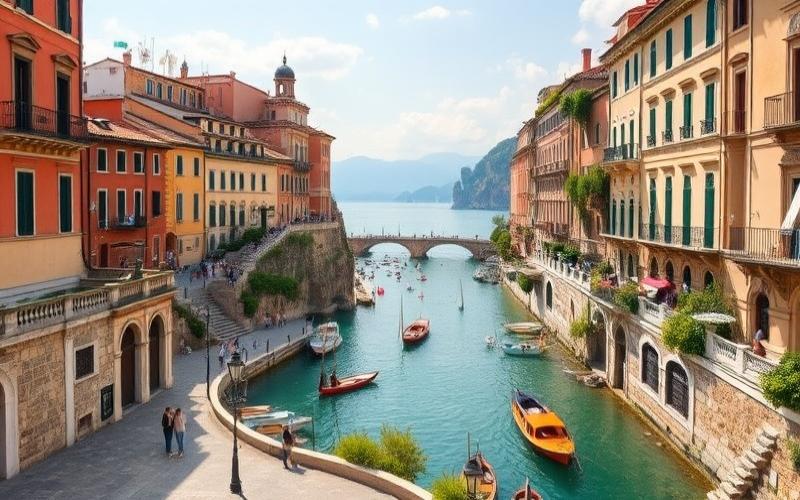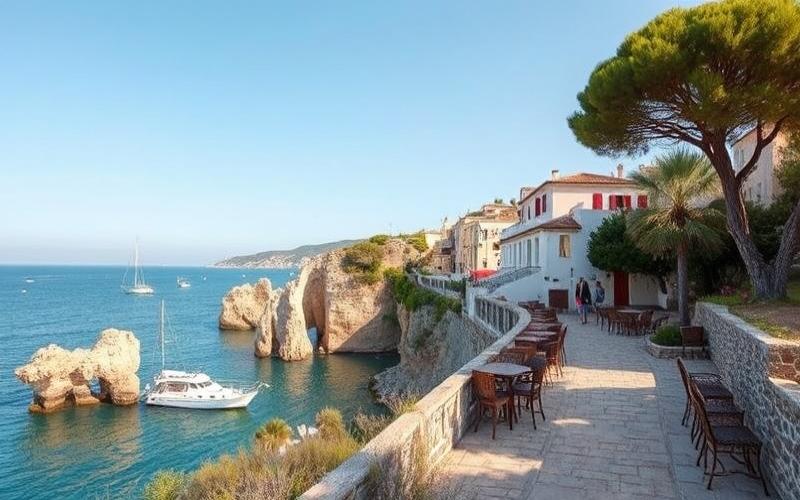
 Published on and written by Cyril Jarnias
Published on and written by Cyril Jarnias
Italy, with its dynamic economy and strategic position at the heart of Europe, attracts many foreign entrepreneurs looking to establish their businesses there. Whether you’re seeking retail space, an office, or a warehouse, this guide will help you navigate the process of finding and leasing professional space in Italy.
The Hunt for Good Deals: How to Find the Ideal Space for Your Business?
Finding the perfect space for your business in Italy may seem like a daunting task, but with the right strategies, you can significantly simplify this process. Here are some effective methods to uncover hidden gems:
Leverage Online Platforms: Websites like Immobiliare.it, Casa.it, and Idealista.it are essential for property searches in Italy. These platforms offer a wide range of commercial properties and allow you to filter searches according to your specific criteria.
Engage Local Real Estate Agencies: Italian real estate agencies have in-depth knowledge of the local market and can help you find properties that perfectly match your needs. They can also guide you through the nuances of the leasing process in Italy.
Explore Industrial and Commercial Areas: Visit the industrial and commercial zones in cities that interest you. You might find interesting opportunities that aren’t necessarily advertised online.
Network with the Local Business Community: Join chambers of commerce or entrepreneur associations. These networks can provide valuable information about real estate opportunities and connect you with potential landlords.
Check Local Newspaper Ads: Although less common in the digital age, this method can sometimes reveal unique opportunities, especially in smaller towns.
Good to Know:
In Italy, it’s common to use a real estate agent to find commercial space. Their fees are typically shared between the landlord and tenant, often representing one month’s rent each.
Real Estate Experts: The Best Agencies for Leasing Your Professional Space
To facilitate your search for commercial space in Italy, it’s wise to engage real estate professionals. Here are some of the main real estate agencies specializing in leasing professional spaces in Italy:
CBRE Italy: A global leader in commercial real estate, CBRE has a strong presence in Italy and offers a complete range of services for leasing offices, commercial spaces, and warehouses.
Cushman & Wakefield: This international agency has multiple offices in Italy and specializes in commercial real estate, offering consulting and leasing services.
JLL (Jones Lang LaSalle): Present in major Italian cities, JLL offers leasing and management services for all types of corporate real estate.
Gabetti: One of Italy’s largest real estate agencies, with a strong national presence and expertise in commercial and industrial real estate.
Tecnocasa: Although primarily known for residential real estate, Tecnocasa also has a dedicated corporate real estate division in many Italian cities.
These agencies can not only help you find the ideal space but also guide you through the legal and administrative aspects of leasing in Italy.
Good to Know:
When selecting an agency, ensure they are members of FIAIP (Federazione Italiana Agenti Immobiliari Professionali), the professional association of real estate agents in Italy. This guarantees a certain level of professionalism and reliability.
Paperwork and Formalities: Essential Documents for Leasing Your Space
Leasing commercial space in Italy requires preparing several documents. Here’s a list of the main required documents:
Lease Agreement (Contratto di locazione): This is the main document governing the relationship between landlord and tenant. It must be registered with the Agenzia delle Entrate (Italian tax authority) within 30 days of signing.
Company Kbis Extract: If your company is already registered in Italy, you’ll need to provide a business registry extract (Visura camerale).
Identification Document: A copy of your passport or ID card will be required.
VAT Number (Partita IVA): If your company is registered in Italy, you’ll need to provide your Italian VAT number.
Bank Guarantee or Security Deposit: Most landlords require a guarantee, typically equivalent to 3-6 months’ rent.
Insurance Certificate: Liability insurance is generally required to cover potential damage to the premises.
Business Plan: Some landlords may request an overview of your business to ensure your ability to pay rent.
Energy Performance Certificate (Attestato di Prestazione Energetica – APE): This document, provided by the landlord, indicates the energy performance of the space.
Good to Know:
In Italy, commercial lease agreements are typically made for 6-year terms, automatically renewable for another 6 years unless notice is given otherwise. This structure, known as “6+6,” offers tenants some stability.
The Bottom Line: How Much Does Professional Space Cost in Italy?
The cost of leasing commercial space in Italy varies considerably depending on several factors, particularly location, size, and property type. Here’s an overview of average costs in major Italian cities:
Milan: This is Italy’s most expensive city for commercial real estate. Rents in the city center can reach €500-600/m²/year for premium locations, while peripheral areas range between €200-300/m²/year.
Rome: In the capital, rents vary from €300-400/m²/year in the historic center to €150-250/m²/year in peripheral areas.
Florence: City center rents are around €250-350/m²/year, while peripheral areas are more affordable at €100-200/m²/year.
Bologna: Rents range between €150-250/m²/year in the city center and €80-150/m²/year in peripheral areas.
Naples: Rents are generally more affordable, ranging from €100-200/m²/year in the center to €50-100/m²/year in peripheral areas.
It’s important to note that these figures are averages and can vary considerably depending on the exact location and quality of the space. Additionally, don’t forget to account for additional expenses:
– Condominium fees (spese condominiali) – Local taxes (imposte locali) – Insurance – Real estate agency fees (typically one month’s rent)
Good to Know:
In Italy, it’s common to pay a security deposit (deposito cauzionale) equivalent to 3 months’ rent at the beginning of the lease. This amount is refundable at the end of the contract if the space is returned in good condition.
Emerging Cities: Where to Establish Your Business at Lower Cost in Italy?
If you’re looking to minimize your setup costs while benefiting from a business-friendly environment, certain Italian cities offer excellent value for money. Here are some destinations to consider:
Bari: The capital of the Apulia region, Bari is experiencing significant economic development, particularly in technology and agri-food sectors. Rents here are significantly more affordable than in Milan or Rome.
Turin: Italy’s former industrial capital, Turin is reinventing itself as an innovation hub. The city offers commercial spaces at competitive prices and benefits from excellent infrastructure.
Padua: Located in the wealthy Veneto region, Padua offers easy access to northern Italian markets while providing more affordable rents than Venice or Milan.
Catania: This Sicilian city is experiencing significant economic growth, particularly in the technology sector. Property costs here are among the lowest of major Italian cities.
Pescara: Located on the Adriatic coast, Pescara offers a good balance between quality of life and business opportunities, with very competitive property costs.
These cities not only offer more affordable property costs but also often provide tax incentives and business support programs to attract investors.
Good to Know:
Some Italian regions, particularly in the south, offer significant tax incentives for businesses establishing there. For example, special economic zones (ZES) in regions like Campania or Calabria can offer substantial tax reductions.
A Welcome Boost: Rental Assistance for Businesses in Italy
Italy offers various aids and incentives to encourage business establishment in its territory. Although programs vary by region and municipality, here are some examples of assistance you might benefit from:
Incentivi per le imprese (Business Incentives): This national program offers grants and reduced-rate loans for businesses establishing in certain regions, particularly in southern Italy.
Programma Resto al Sud: This initiative supports business creation in southern Italy, offering grants and zero-interest loans that can be used for leasing commercial spaces.
Regional Tax Incentives: Many Italian regions offer tax reductions for businesses establishing there, particularly in economically disadvantaged areas.
Municipal Programs: Some cities offer specific programs to attract businesses. For example, Milan has launched initiatives to support startup establishment in certain neighborhoods.
European Funds: Italy benefits from European structural funds that can be used to support business development, including for space leasing.
Research and Development Tax Credit: Although not specific to leasing, this tax credit can indirectly help businesses finance their spaces by reducing their overall tax burden.
To benefit from these aids, it’s recommended to contact local chambers of commerce (Camera di Commercio) or regional development agencies. These organizations can provide detailed information about programs available in your target area.
Good to Know:
Italy has recently established “urban free zones” (Zone Franche Urbane) in certain cities, offering significant tax exemptions for businesses establishing there. These zones can represent an interesting opportunity to reduce your setup costs.
Conclusion: Italy, Land of Opportunities for Your Business
Finding and leasing commercial space, an office, or a warehouse in Italy may seem complex at first, but with the right information and resources, this process can be managed effectively. Italy offers a great diversity of options, from prestigious city centers to developing industrial areas, allowing every business to find the ideal location according to its needs and budget.
Remember that the key to success lies in thorough preparation. Take the time to understand the local market, current regulations, and available assistance. Don’t hesitate to engage local professionals, such as real estate agents or specialized lawyers, to guide you through this process.
Italy, with its strategic position in Europe, its rich industrial and commercial fabric, and its recognized quality of life, remains a prime destination for many international businesses. By choosing your location wisely and leveraging available assistance, you can create a solid foundation for your business’s success in the Italian market.
Disclaimer: The information provided on this website is for informational purposes only and does not constitute financial, legal, or professional advice. We encourage you to consult qualified experts before making any investment, real estate, or expatriation decisions. Although we strive to maintain up-to-date and accurate information, we do not guarantee the completeness, accuracy, or timeliness of the proposed content. As investment and expatriation involve risks, we disclaim any liability for potential losses or damages arising from the use of this site. Your use of this site confirms your acceptance of these terms and your understanding of the associated risks.
















